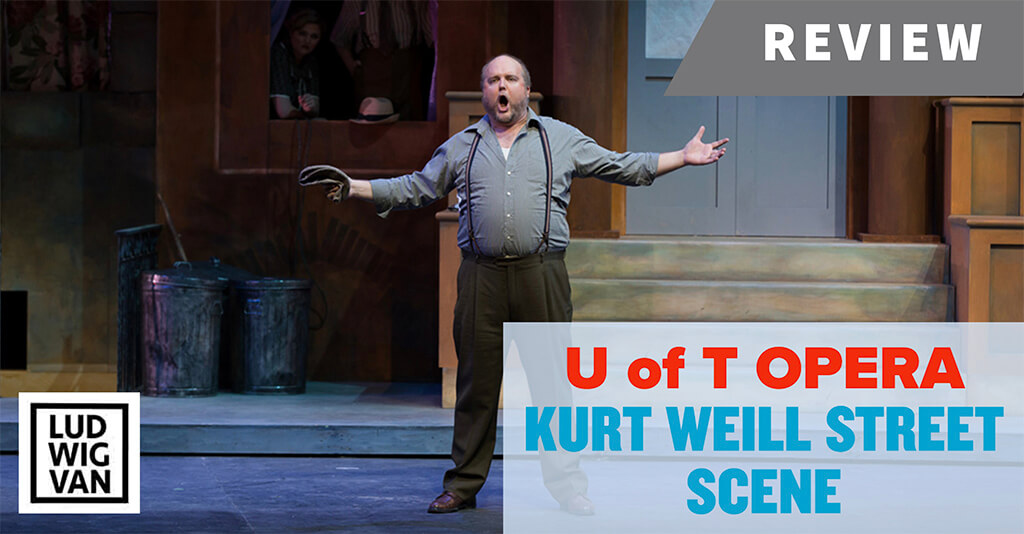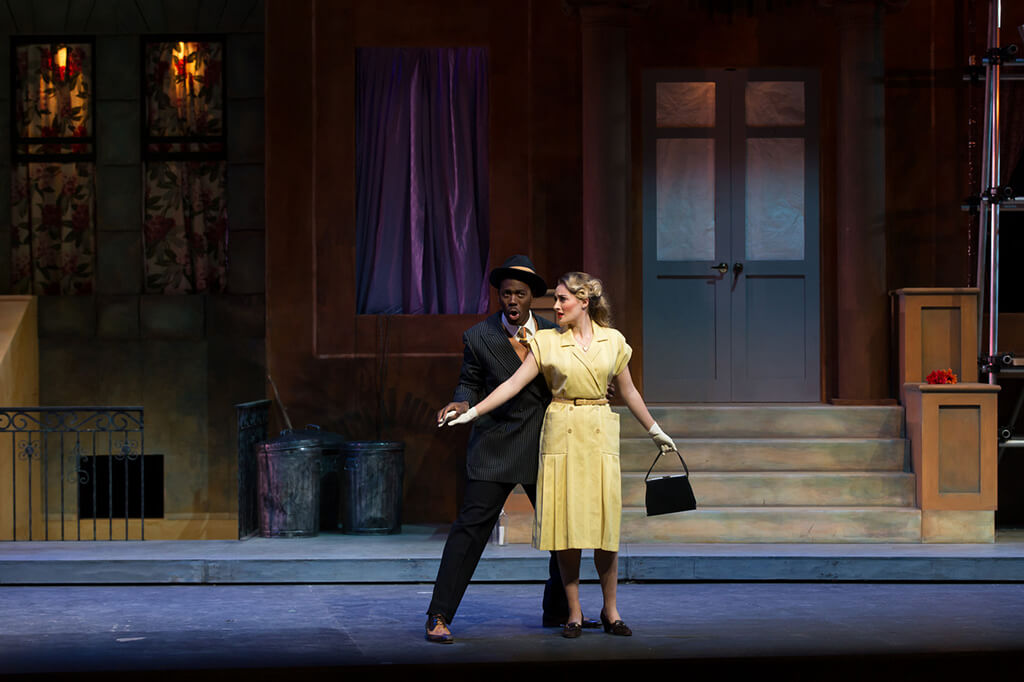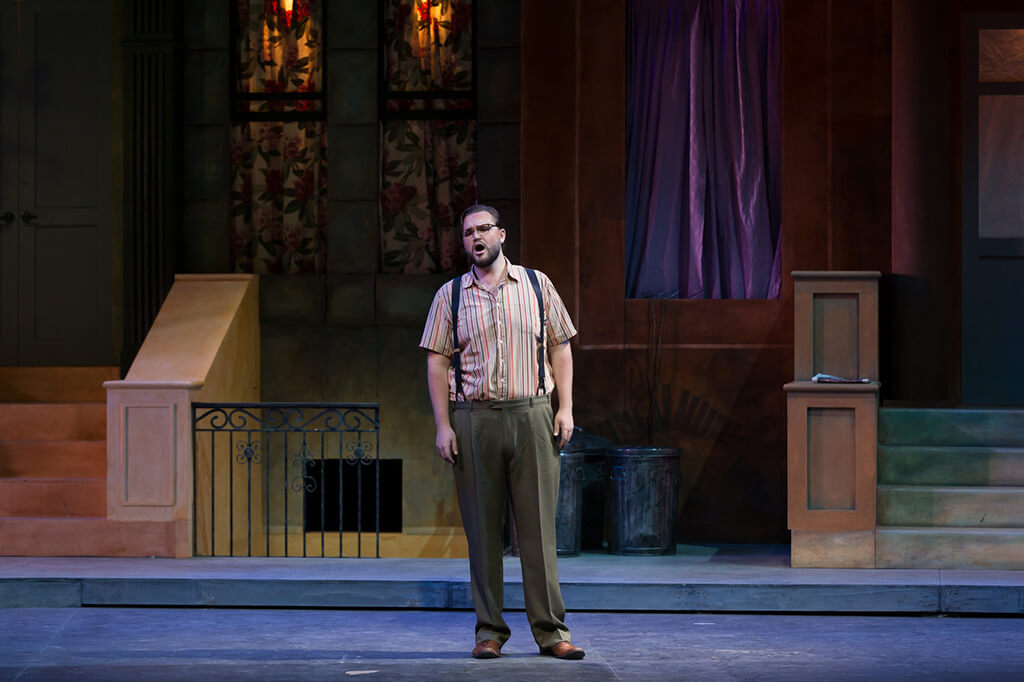
Kurt Weill: Street Scene. Peter McGillivray, Tatiana Stanishich, Matthew Cairns, Emma Greve, Maeve Palmer, River Guard, Korin Thomas-Smith, Jamie Groote, Emma Bergin, Quinn Mitchell and others. Sandra Horst (conductor), Michael Albano (stage director), Anna Theodosakis (choreographer). Macmillan Theatre, Edward Johnson Building, University of Toronto, Nov. 22, 2018.
The U of T Opera opened its new season with Kurt Weill’s Street Scene, his “American” opera. Composed by the German-Jewish composer in 1946 and premiered on Broadway the following year, Street Scene reflects a melding of the traditional European opera with American musical theatre. It is based on the Pulitzer Prize-winning play by Elmer Rice, with lyrics by Langston Hughes.
Weill won a Tony for Best Original Score for this work, and it had a respectable run on Broadway of 148 performances. Street Scene is considered more “opera” than “musical,” and as such, it was hardly ever seen on Broadway, but has found a niche in opera houses and to a less extent university music departments and conservatories. In five decades of attending live opera, I managed to catch it only once, around 2000 at the Lyric Opera of Chicago, with Catherine Malfitano as Anna Maurrant, and Gregory Turay as Sam Kaplan.
Naysayers (and opera purists) haven’t been very kind to Street Scene, claiming it doesn’t represent Weill at his best, when compared to his works of a similar style such as Die Dreigroschenoper or Aufstieg und Fall der Stadt Mahagonny. These last two are undisputed classics with a not-so-hidden socio-political commentary. They were also composed at a time when Weill was still in Germany but already influenced by jazz and other musical genres. Street Scene is less political, but it speaks to its audience and can be very effective.

The U of T Opera’s Street Scene lived up to its potential, in a beautifully executed production, featuring an attractive if somewhat generic set (which is a good thing in this piece!) by Fred Perruzza. The huge ensemble cast was taken by opera students of various levels of training and vocal/technical gifts. but everyone rose to the occasion and gave committed performances, investing each role with energy and enthusiasm, be it dancing, singing, or chorus work.
In a nutshell — the story depicts the lives over a two-day period of the residents of a Manhattan East Side tenement, with the focus on the Maurrant family, the romance between the daughter Rose and her neighbour Sam Kaplan, and the alleged affair between the mother Anna and the milkman, Steve Sankey. The father Frank is arrested when he discovers the liaison and shoots his wife and her lover dead. Meanwhile, Rose leaves to strike out on her own.
One could say the plot line is rather reminiscent of daytime soaps on American TV — perhaps The Goldbergs (1929-1946)? — although with a much darker denouement. Weill’s genius of borrowing from American Musicals, and his meticulous delineation of each character in the show, makes Street Scene memorable. Seen on opening night (Nov. 22), one was struck by the musical polish from both onstage and in the pit. Visually, it is one of the best-looking shows at the U of T Opera in recent memory.

Since there were four performances in as many days, several (though not all) of the principals were double-cast. Given the huge ensemble, it’s impossible to mention everyone in this review. That said, I can honestly say everyone on stage gave his/her committed and energetic best, without exception. Top honours belonged to a U of T Opera Alumnus, baritone Peter McGillivray, who was totally convincing as the curmudgeonly and violence-prone Frank Maurrant. With a decade’s long professional career, McGillivray has the maturity of a seasoned performer, a requisite for this role and nearly impossible to find in the typical younger age group of student singers. Drafting him in this role was an inspired casting choice.
Also on a very high level was the Sam Kaplan of tenor Matthew Cairns. This character has the great “Lonely House” and Cairns did not disappoint. His natural reticence as an actor suited the role of this shy young man very well. Another promising tenor, River Guard, shone in the supporting role of the flamboyant Lippo Fiorentino. Together with Maeve Palmer (Greta), they nearly stole the show in an over-the-top Ice Cream Sextet.
Among the women, Tatiana Stanishich was a sympathetic Anna. Emma Greve (Rose) sang an affecting “What Good Would the Moon Be?” — a lovely moment in the score. Another terrific number is “Moon-faced, starry-eyed” here beautifully sung and fabulously danced with plenty of flair by Caroline Stanczyk (Mae Jones) and Alexander Bowie (Dick McGann) — who says opera singers can only “park and bark”? In fact, this show enjoyed excellent choreography by Anna Theodosakis, and the challenge was splendidly met by the fearless dancing of the opera singers — bravi tutti.

It should be noted that the copious amount of dialogue might well have taken a toll on some of the singing. MacMillan Theatre is not tiny, and it’s not easy to project into that space without amplification. In fact, I don’t recall the same huge amount of spoken dialogue in the Lyric Opera production I saw. If this were done on Broadway, the singers would have been miked, but here, they coped quite well under the circumstances.
Conductor Sandra Horst drew lovely sounds from the pit, leading the U of T Orchestra in an idiomatic and lyrical reading of the score. Director Michael Patrick Albano took a middle-of-the-road approach and it worked very well. All in all, a most auspicious start to the U of T Opera’s 2018-19 season.
Update: Dec. 4, 2018. A previous version included an incorrect spelling of Tatiana Stanishich’s name.



